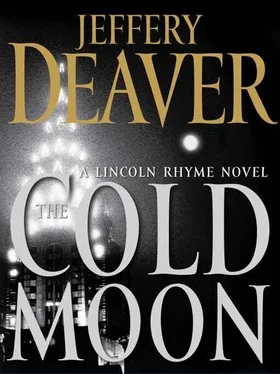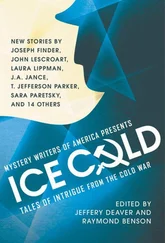"What's the problem?" Sellitto asked.
"It's not the protein itself. It's the fact it was on the second victim. Adams."
"Because?"
"It means the perp was checking out the workshop earlier-presumably the victim and looking for alarms or security cameras. He's been staking out his locations. Which means there's a reason he's picking these particular victims. But what the hell is it?"
The man crushed to death in the alley wasn't apparently involved in any criminal activities and had no enemies. The same was true with Joanne Harper. And she'd never heard of Adams-no link between them. Yet they'd both been targeted by the Watchmaker. Why them? Rhyme wondered. An unknown victim at the pier, a young businessman, a florist…and seven others to go. What is there about them that's driving him to kill? What's the connection?
"What else did you find?"
"Black flakes," Cooper said, holding up a plastic envelope. Inside were dots like dried black ink.
Sachs said, "They were from where he got the wire spool and where he was probably hiding. Also, I found a few of them outside the front door where he'd stepped on the glass running to the Explorer."
"Well, run them through the GC."
Cooper fired up the gas chromatograph/mass spectrometer and loaded a sample of the flakes. In a few minutes the results came up on the screen.
"So, what do we have, Mel?"
The tech shoved his glasses higher on his nose. He leaned forward. "Organic…Looks like about seventy-three percent n-alkanes, then polycyclic aromatic hydrocarbons and thiaarenes."
"Ah, roofing tar." Rhyme squinted.
Kathryn Dance gave a laugh. "You know that?"
Sellitto said, "Oh, Lincoln used to wander around the city collecting everything he could find for his evidence databases… Must've been fun going out to dinner with you, Linc. You bring test tubes and bags with you?"
"My ex could tell you all about it," Rhyme replied with an amused grunt. His attention was on the black spots of tar. "I'll bet he's been checking out another victim from a place that's getting a new roof."
"Or maybe they're reroofing his place," Cooper offered.
"Doubt he's spending time enjoying cocktails and the sunset on his own roof in this weather," Rhyme replied. "Let's assume it's somebody else's. I want to find out how many buildings are being reroofed right now."
"There could be hundreds of them, thousands," Sellitto said.
"Probably not in this weather."
"And how the hell do we find them anyway?" the rumpled detective asked.
"ASTER."
"What's that?" Dance asked.
Rhyme recited absently, "Advanced Spaceborne Thermal Emission and Reflection Radiometer. It's an instrument and data package on the Terra satellite-a joint venture between NASA and the Japanese government. It captures thermal images from space. Orbits every…what, Mel?"
"About ninety-eight minutes. But it takes sixteen days to cover the entire Earth."
"Find out when it was over New York most recently. I want thermal images and see if they can delineate heat over two hundred degrees-I imagine tar's at least that temperature when it's applied. Should narrow down where he's been."
"The whole city?" Cooper asked.
"He's hunting in Manhattan, looks like. Let's go with that first."
Cooper had a lengthy conversation then hung up. "They're on it. They'll do their best."
Thom showed Dennis Baker into the town house. "No other witnesses around the florist's workshop," the lieutenant reported, pulling off his coat and gratefully accepting a cup of coffee. "We searched for an hour. Either nobody saw anything or has the guts to admit they did. This guy's got everybody spooked."
"We need more." Rhyme looked at the diagram that Sachs had sketched of the scene. "Where was the SUV parked?" he asked.
"Across the street from the workshop," Sachs replied.
"And you searched the spot where it was parked." It wasn't a question. Rhyme knew she would have. "Any cars in front or behind it?"
"No."
"Okay, he runs to the car, his partner drives to the closest intersection and turns, hoping to get lost in the traffic. He won't break any laws so he'll make a nice, careful-and sharp-turn, staying in his lane." Like speed bumps and sudden braking, sharp, slow turns often dislodge important trace from treads of tires. "If the street's still sealed off, I want a team from Crime Scene to sweep up everything at the intersection. It's a long shot but I think we have to try." He turned to Baker. "You just left the scene, right? About ten, fifteen minutes ago?"
"About that," Baker replied, sitting and stretching as he downed his coffee. He looked exhausted.
"Was the street still sealed?"
"Wasn't paying much attention. I think it was."
"Find out," Rhyme said to Sellitto, "and if so, send a team."
But the detective's call revealed that the street was now open to traffic. Any trace left by the killer's Explorer would have been obliterated by the first or second vehicle making the same turn.
"Damn," Rhyme muttered, his eyes returning once again to the evidence chart, thinking it had been a long time since a case had presented so much difficulty.
Thom rapped on the doorjamb and led someone else into the room, a middle-aged woman in an expensive black coat. She was familiar to Rhyme but he couldn't recall the name.
"Hello, Lincoln."
Then he remembered. "Inspector."
Marilyn Flaherty was older than Rhyme but they'd both been captains at the same time and had worked together on a few special commissions. He remembered her as being smart and ambitious-and, out of necessity, just a little bit flintier and more driven than her male counterparts. They spoke for a few minutes about mutual acquaintances and colleagues past and present. She asked about the Watchmaker case and he gave her a synopsis.
The inspector then pulled Sachs aside and asked about the status of the investigation, meaning, of course, the Other Case. Rhyme couldn't help overhearing Sachs tell her that she'd found nothing conclusive. There'd been no major drug thefts from the evidence room of the 118th Precinct. Creeley's partner and his employees confirmed the businessman's depression and reported that he'd been drinking more lately. It turned out that he'd been going to Vegas and/or Atlantic City recently.
"Possible organized crime connection," Flaherty pointed out.
"That's what I was thinking," Sachs said. Then she added that there seemed to be no clients with grudges against Creeley but that she and Pulaski were awaiting the client list from Jordan Kessler to check it out themselves.
Suzanne Creeley, though, remained convinced that he'd had nothing to do with drugs or criminal activity and that he hadn't killed himself.
"And," Sachs said, "we've got another death."
" Another one?"
"A man who came to the St. James a few times. Maybe met with the same people that Creeley did."
Another death? Rhyme reflected. He had to admit that the Other Case was developing some very interesting angles.
"Who?" Flaherty asked.
"Another businessman. Frank Sarkowski. Lived in Manhattan."
Flaherty was looking over the lab, the evidence charts, the equipment, frowning. "Any clue who killed him?"
"I think it was during a robbery. But I won't know until I read the file."
Rhyme could see the frustration in Flaherty's face.
Sachs too was tense. He soon realized why. As soon as Flaherty said, "I'm going to hold off on Internal Affairs for the time being," Sachs relaxed. They weren't going to take the case away from her. Well, Lincoln Rhyme was happy for Sachs, though in his heart he would have preferred that she hand off the Other Case to Internal Affairs and get back to working on His Case.
Flaherty asked, "That young officer? Ron Pulaski? He's working out okay?"
Читать дальше












